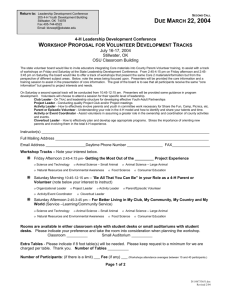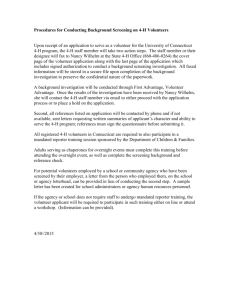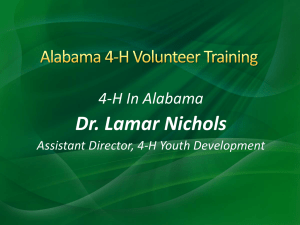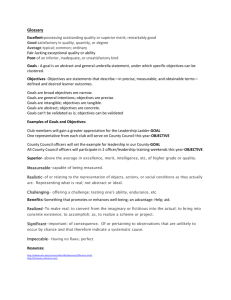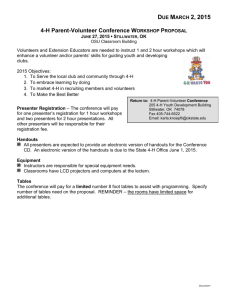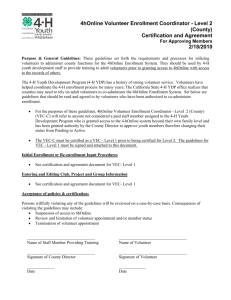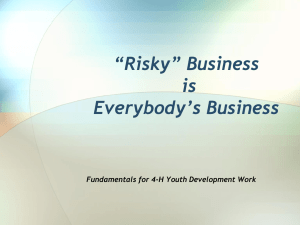MVP+Core+Components+Sec+3
advertisement
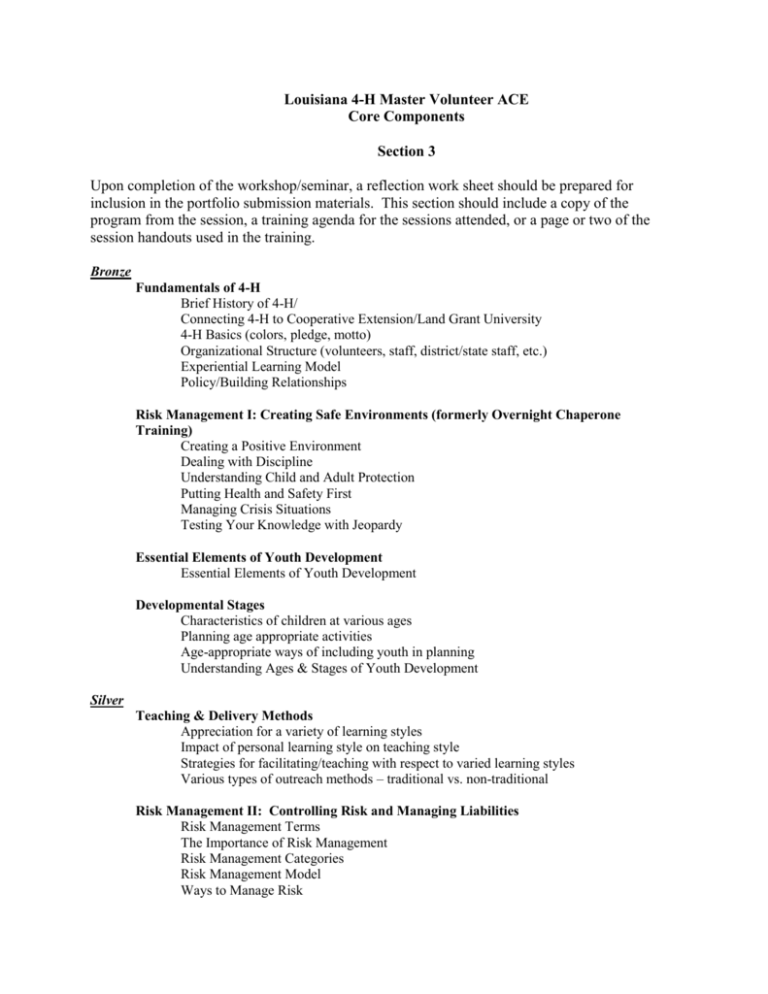
Louisiana 4-H Master Volunteer ACE Core Components Section 3 Upon completion of the workshop/seminar, a reflection work sheet should be prepared for inclusion in the portfolio submission materials. This section should include a copy of the program from the session, a training agenda for the sessions attended, or a page or two of the session handouts used in the training. Bronze Fundamentals of 4-H Brief History of 4-H/ Connecting 4-H to Cooperative Extension/Land Grant University 4-H Basics (colors, pledge, motto) Organizational Structure (volunteers, staff, district/state staff, etc.) Experiential Learning Model Policy/Building Relationships Risk Management I: Creating Safe Environments (formerly Overnight Chaperone Training) Creating a Positive Environment Dealing with Discipline Understanding Child and Adult Protection Putting Health and Safety First Managing Crisis Situations Testing Your Knowledge with Jeopardy Essential Elements of Youth Development Essential Elements of Youth Development Developmental Stages Characteristics of children at various ages Planning age appropriate activities Age-appropriate ways of including youth in planning Understanding Ages & Stages of Youth Development Silver Teaching & Delivery Methods Appreciation for a variety of learning styles Impact of personal learning style on teaching style Strategies for facilitating/teaching with respect to varied learning styles Various types of outreach methods – traditional vs. non-traditional Risk Management II: Controlling Risk and Managing Liabilities Risk Management Terms The Importance of Risk Management Risk Management Categories Risk Management Model Ways to Manage Risk Service-Learning Experiential learning models Life skill Development Define service-learning Understanding the various components of the service-learning cycle Explaining the benefits of service-learning Gold Leadership Basics Defining Leadership Understanding personal leadership style on teaching style Assessing characteristics of “good” leaders Ethical Decision Making Youth/Adult Partnerships Origins of the ladder of participation Developing a shared vision or objectives for the project Clear and Frequent Communication Understanding clear expectations and roles Planning and designing a project together People Skills Communication Interpersonal Skills Teamwork Flexibility Emerald Supervising an Impact Wise use of power in leadership situations Leadership in change situations Communicating and leading situations Thinking big and taking risks as a leader Conducting Assessment/Goal Setting Marketing 4-H Thinking about public relations Creating a message for others Approaching the media (print and visual) Diversity and Inclusion Valuing unique contributions of individuals Recognizing similarities among individuals Identifying strategies to help others develop tolerance and understanding Resources to help with accommodation and engagement. Louisiana Master Volunteer ACE Core Components Training Contents In the Louisiana 4-H Master Volunteer ACE program, the following workshops/seminars are required for successful completion of the identified level. Note that the core workshops may be offered as sessions at the Volunteer Leaders Conference or as workshops/seminars at district or parish leader association meetings, as sessions at statewide Master Volunteer ACE training events, or by scheduling them in your parish or district through Extension staff and/or volunteers knowledgeable in the subject. While length of instruction may vary for each topic, it is understood that none of the topics may be properly introduced in less than one hour, and that various presenters may spend considerably more time to insure that the materials are covered appropriately. A list of the items that must be covered as a minimum is available for presenters. In order to request credit for participation in Core Training Seminars or Workshops, the following standards have been identified for course content. If the training covers these identified areas of instruction, the workshop or seminar may be counted as a core component. Workshops may be taught by experienced volunteers and/or Extension professionals. Credit should not be requested for training participation by the class instructor. For example, if Mrs. Ima Volunteer needs credit for Fundamentals of 4-H, she must sit for someone else to teach the class, even if she has taught other volunteers this training topic previously. Then, for any other time that Mrs. Volunteer teaches the topic, she may claim service activity credit for teaching.
